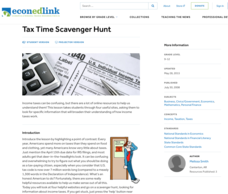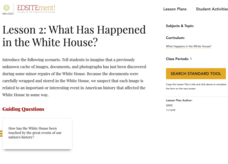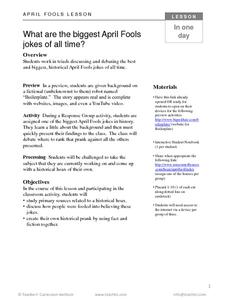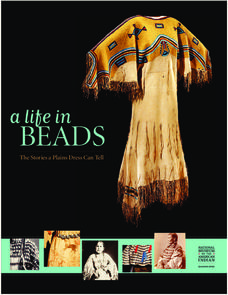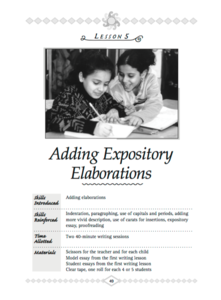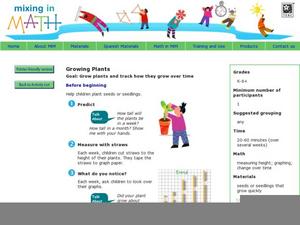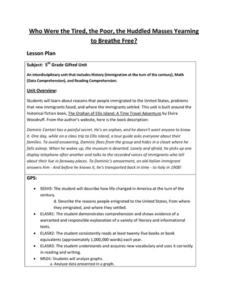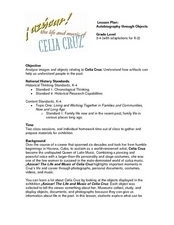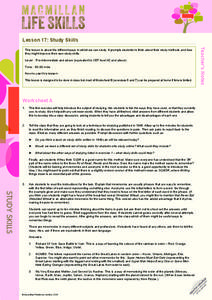Council for Economic Education
Tax Time Scavenger Hunt
Is a 1040EZ tax form really easy? Scholars investigate the complexities of the United States taxation system with an economics lesson. Using a wide variety of web sources, they interpret IRS taxation rules and regulations to better...
California Department of Education
Evaluating Web Sites
If it's on the Internet, it must be true—right? How can someone tell if a website contains less-than-truthful information? Savvy surfers evaluate sources in the fifth of a six-part college and career readiness instructional activity...
Film English
The Beauty of a Second
Add many seconds of beauty to your class with a short film and related project. The resource centers around a competition based on one-second segments of film, and the final compilation that came from the contest. Pupils identify moments...
Film English
Gratitude
Encourage your class to experience gratitude. In order to do so, discuss what your pupils are grateful for and show them a short film about gratitude. The class watches the video a couple of times before responding to a quotation taken...
Curriculum Corner
Guest Teacher Plans (Grade 2)
Be prepared the next time you're in need of a substitute with a daily plan equipped with an assortment of activities covering subjects math, reading, word work, writing, and science.
Prestwick House
Teaching Shakespeare: Sonnet 73
It's that time of year to consider how Shakespeare selects his images and structures his Sonnet 73 to develop the meaning of the poem. Class members examine the rhyme scheme, the indented lines, the conceit, and the images used in each...
National Endowment for the Humanities
Lesson 2: What Has Happened in the White House?
Working in small groups, or individually, learners are given images of events that took place at the White House. They study the image and research that time in history to better understand how the White House has been affected by...
Griffen Publishing
Learning From the Past
The big idea for this lesson is that the past enriches our present and future. Learners explore the origin of the Olympic Games and how one man took an event from the past and reinvented it for modern times. They compare and contrast the...
North Carolina Consortium for Middle East Studies
Missing Pieces of the Puzzle: African Americans in Revolutionary Times
What's missing from most studies of the American Revolutionary War is information about the role African Americans played in the conflict. To correct this oversight, middle schoolers research groups like the Black Loyalists and Black...
Canadian Museum of Civilization Corporation
Artifacts Tell Stories: Creating a First World War Museum in the Classroom
Although designed for the Canadian War Museum, the concept here is a solid one. Class members select an artifact from the First World War, examine it, research it, and craft an explanative label that they attach to their picture and post...
TCI
What Are the Biggest April Fools Jokes of All Time?
After working in groups to analyze primary sources related to a historical hoax, learners will discuss how people managed to be fooled and work to identify one of the biggest April Fools jokes in history.
Smithsonian Institution
A Life in Beads: The Stories a Plains Dress Can Tell
Young learners discover how the Sioux and Assiniboine tribes preserved native culture through the making of traditional dresses, identifying the resources used to make the dresses and discussing behind the meaning behind some American...
Scholastic
Adding Expository Elaborations
How can you tell if a prompt is expository or narrative? Help your learners identify key words in writing prompts to determine how they should craft their essays.
Curated OER
Lesson Learned: Creating a Life Reports Project
Tap into the wisdom and knowledge of older members of the community with this New York Times plan. To warm up, learners write about and discuss advice they have been given. After reading "The Life Report," an op-ed column that asks older...
The New York Times
Stress Less: Understanding How Your Mind and Body Respond to Anxiety
What could be more relevant to teens and preteens than experiencing stress? Use an article from the New York Times website to practice valuable Common Core skills for informational text reading, and also get a discussion going in your...
Mixing In Math
Mixing in Math: Growing Plants
Whether you have your class plant seeds or begin when sprouts are visible, math skills are used here to predict and track growth over time. Straw bar graphs show plant height on a given day while the graph as a whole shows changes over...
Northeast Georgia Regional Educational Service Agency
Who Were the Tired, the Poor, the Huddled Masses Yearning to Breathe Free?
Elvira Woodruff's The Orphan of Ellis Island: A Time Travel Adventure is the core text in a interdisciplinary unit study of immigration at the turn of the century.
Curated OER
Modern Minstrelsy: Exploring Racist Stereotypes in Literature and Life
Satires may be designed to expose a bias to ridicule but if misunderstood can they reinforce that bias? Langston Hughes poem, “Minstrel Man” opens a discussion of racist stereotypes, the minstrel tradition, and the musical, “The...
Curated OER
Technology as Change: The Atlantic Canada Fishery
A wonderfully constructed series of lessons on the history of the fishing industry in Canada. They discuss what they already know about the methods and technology used in the fishing industry past and present, create a research report...
Curated OER
Pride and Prejudice: KWHL
How much does your class know about the setting of Pride and Prejudice? Explore Jane Austen's romantic world with a KWHL chart that helps kids note what they already know about 18th century England, what they want to know, how they will...
Illustrative Mathematics
Velocity vs. Distance
At the end of this activity, your number crunchers will have a better understanding as to how to describe graphs of velocity versus time and distance versus time. It is easy for learners to misinterpret graphs of velocity, so have them...
Polar Trec
Ice Cores: Modeling Ice Sheets
Ice cores provide scientists with knowledge of historic melt layers, air temperatures, greenhouse gases, and climate stability. Scholars work in groups to build layers representing snow and ice over thousands of years. Then, groups...
Smithsonian Institution
Autobiography through Objects
Show youngsters how objects can tell a story! Here your class will learn about Cuban salsa dancer Celia Cruz by analyzing pictures of her dress, her shoes, and her marriage certificate. After describing Cruz's items and imagining what...
Macmillan Education
Study Skills
Go beyond simply telling students to improve their work ethic and study habits with this complete lesson on developing study skills!
Other popular searches
- Telling Time Lesson
- Calendar Telling Time
- Telling Time Analog
- Spanish Telling Time
- Telling Time to the Half Hour
- Telling Time Clocks
- Telling Time Worksheets
- Telling Time to the Hour
- Telling Time to the Minute
- Telling Time Hour
- Telling Time Minute
- Telling Time Lesson Plans


